Employability Skills Training Program for UNICEF UK Staff Report
VerifiedAdded on 2023/06/13
|12
|2526
|398
Report
AI Summary
This report outlines an employability skills training program designed for new employees at UNICEF UK, particularly those from minority backgrounds. The program focuses on key areas such as building emotional intelligence through verbal and non-verbal communication skills, developing self-management skills by teaching principles of self-management and goal setting, enhancing energy management skills through awareness and responsibility, and boosting self-esteem and confidence through recognition and appreciation. The training methods include didactic teaching, skill-based teaching with visual aids, and work-integrated learning with service components. The program aims to equip employees with essential employability skills, foster a sense of belonging, and ensure equal opportunities within the workplace, ultimately leading to better decision-making, more effective interpersonal relationships, and increased job satisfaction. The report concludes with recommendations for establishing an employability skills committee and creating awareness among existing staff to support the integration of new employees.
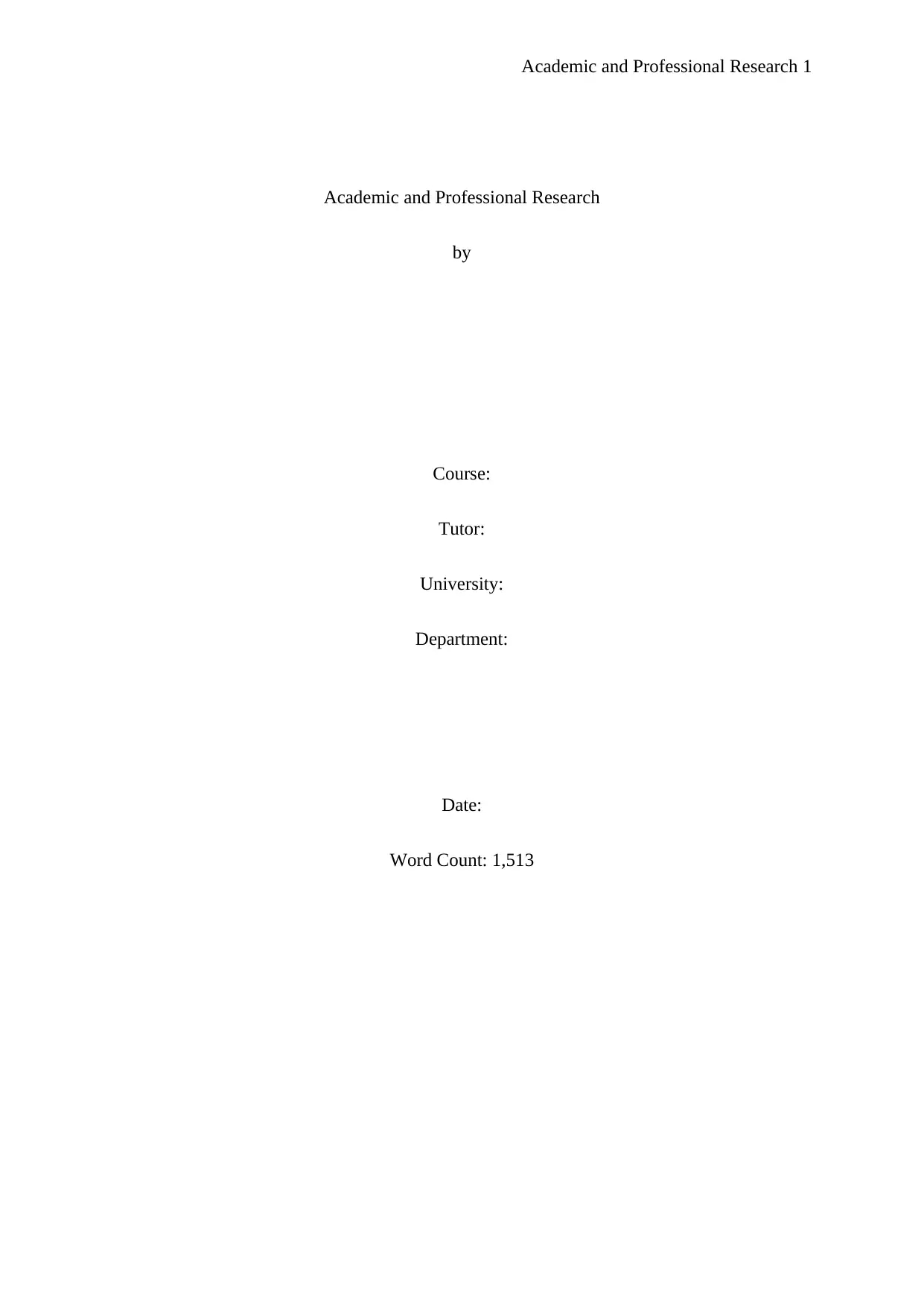
Academic and Professional Research 1
Academic and Professional Research
by
Course:
Tutor:
University:
Department:
Date:
Word Count: 1,513
Academic and Professional Research
by
Course:
Tutor:
University:
Department:
Date:
Word Count: 1,513
Paraphrase This Document
Need a fresh take? Get an instant paraphrase of this document with our AI Paraphraser
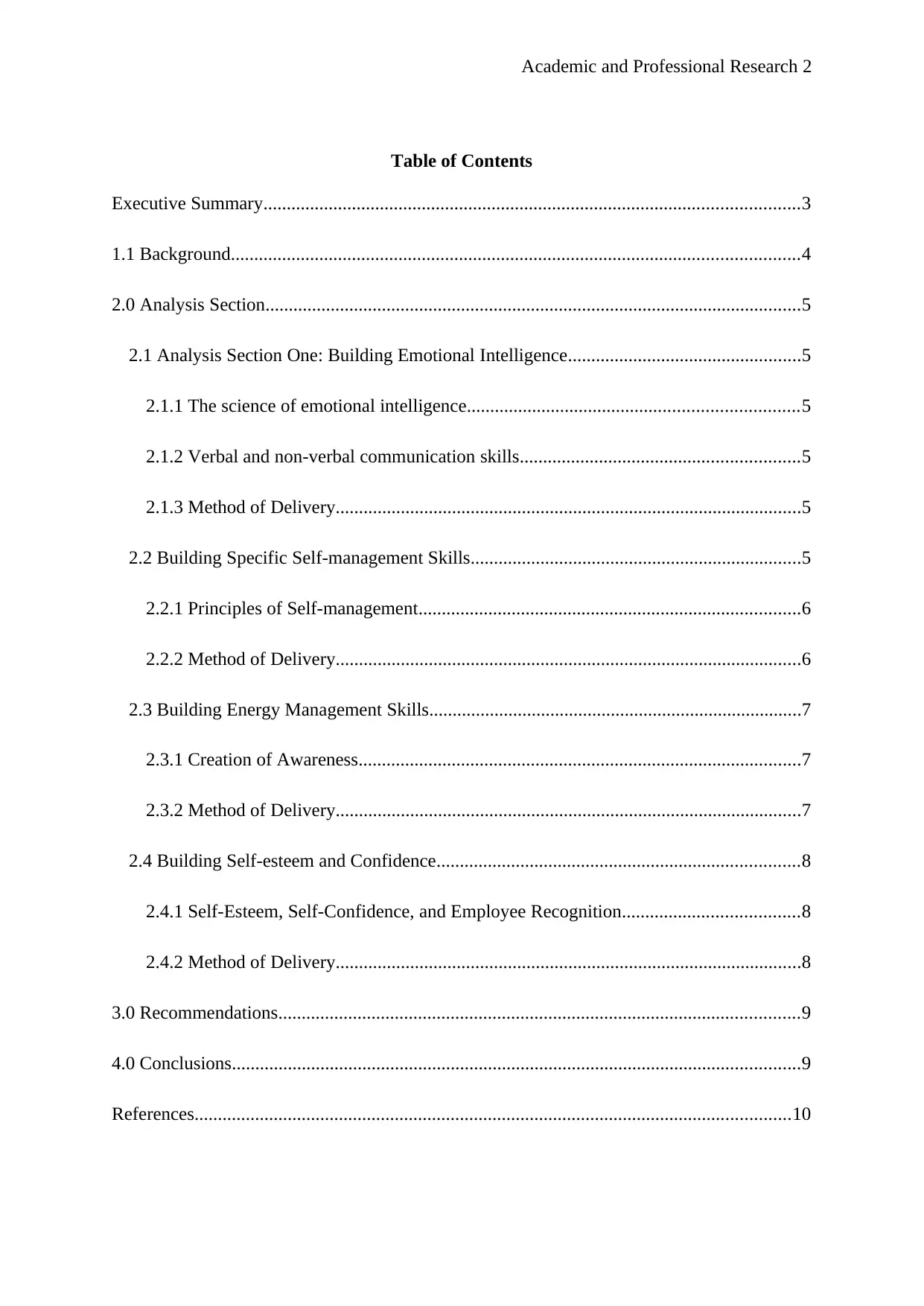
Academic and Professional Research 2
Table of Contents
Executive Summary...................................................................................................................3
1.1 Background..........................................................................................................................4
2.0 Analysis Section...................................................................................................................5
2.1 Analysis Section One: Building Emotional Intelligence..................................................5
2.1.1 The science of emotional intelligence.......................................................................5
2.1.2 Verbal and non-verbal communication skills............................................................5
2.1.3 Method of Delivery....................................................................................................5
2.2 Building Specific Self-management Skills.......................................................................5
2.2.1 Principles of Self-management..................................................................................6
2.2.2 Method of Delivery....................................................................................................6
2.3 Building Energy Management Skills................................................................................7
2.3.1 Creation of Awareness...............................................................................................7
2.3.2 Method of Delivery....................................................................................................7
2.4 Building Self-esteem and Confidence..............................................................................8
2.4.1 Self-Esteem, Self-Confidence, and Employee Recognition......................................8
2.4.2 Method of Delivery....................................................................................................8
3.0 Recommendations................................................................................................................9
4.0 Conclusions..........................................................................................................................9
References................................................................................................................................10
Table of Contents
Executive Summary...................................................................................................................3
1.1 Background..........................................................................................................................4
2.0 Analysis Section...................................................................................................................5
2.1 Analysis Section One: Building Emotional Intelligence..................................................5
2.1.1 The science of emotional intelligence.......................................................................5
2.1.2 Verbal and non-verbal communication skills............................................................5
2.1.3 Method of Delivery....................................................................................................5
2.2 Building Specific Self-management Skills.......................................................................5
2.2.1 Principles of Self-management..................................................................................6
2.2.2 Method of Delivery....................................................................................................6
2.3 Building Energy Management Skills................................................................................7
2.3.1 Creation of Awareness...............................................................................................7
2.3.2 Method of Delivery....................................................................................................7
2.4 Building Self-esteem and Confidence..............................................................................8
2.4.1 Self-Esteem, Self-Confidence, and Employee Recognition......................................8
2.4.2 Method of Delivery....................................................................................................8
3.0 Recommendations................................................................................................................9
4.0 Conclusions..........................................................................................................................9
References................................................................................................................................10
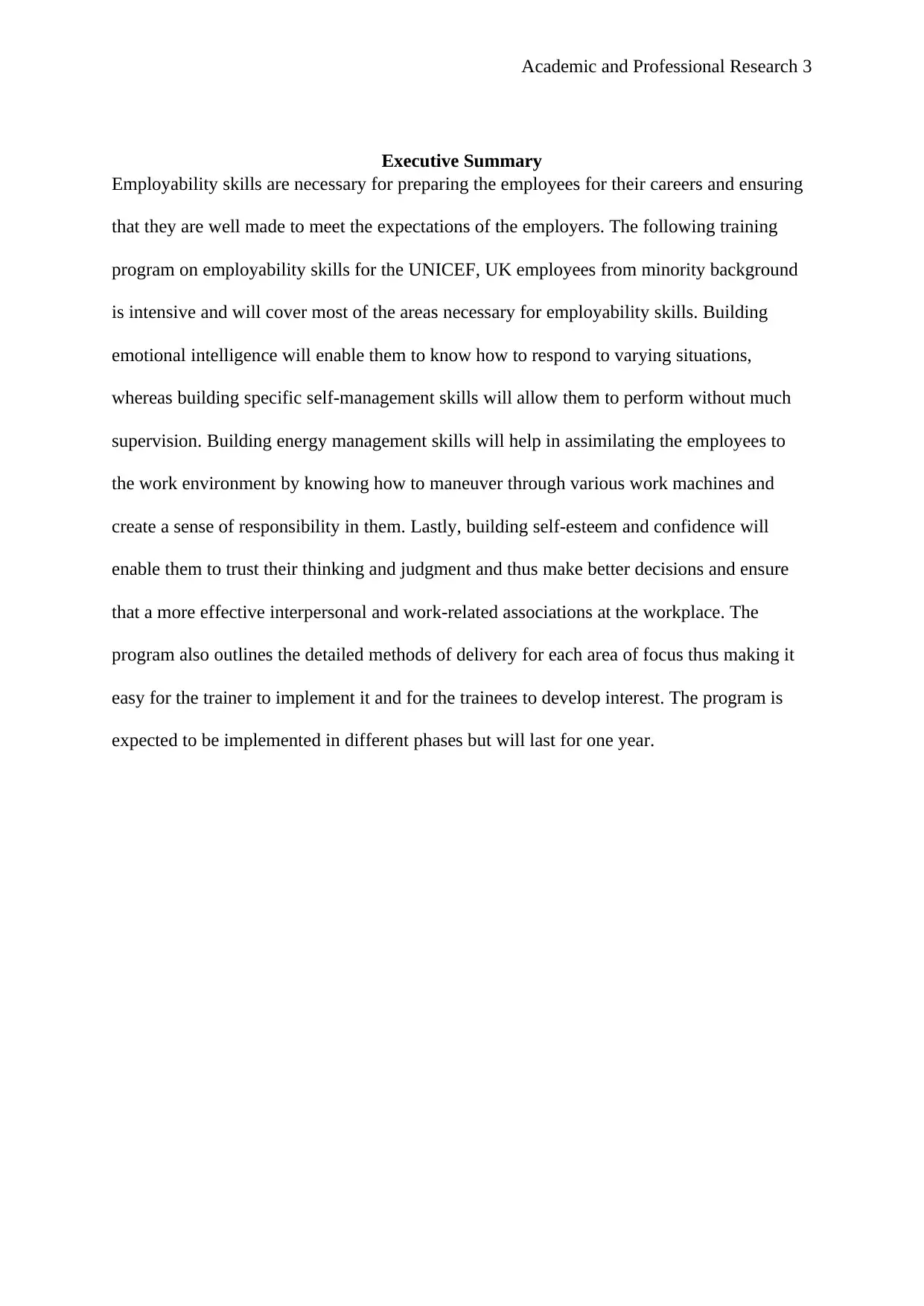
Academic and Professional Research 3
Executive Summary
Employability skills are necessary for preparing the employees for their careers and ensuring
that they are well made to meet the expectations of the employers. The following training
program on employability skills for the UNICEF, UK employees from minority background
is intensive and will cover most of the areas necessary for employability skills. Building
emotional intelligence will enable them to know how to respond to varying situations,
whereas building specific self-management skills will allow them to perform without much
supervision. Building energy management skills will help in assimilating the employees to
the work environment by knowing how to maneuver through various work machines and
create a sense of responsibility in them. Lastly, building self-esteem and confidence will
enable them to trust their thinking and judgment and thus make better decisions and ensure
that a more effective interpersonal and work-related associations at the workplace. The
program also outlines the detailed methods of delivery for each area of focus thus making it
easy for the trainer to implement it and for the trainees to develop interest. The program is
expected to be implemented in different phases but will last for one year.
Executive Summary
Employability skills are necessary for preparing the employees for their careers and ensuring
that they are well made to meet the expectations of the employers. The following training
program on employability skills for the UNICEF, UK employees from minority background
is intensive and will cover most of the areas necessary for employability skills. Building
emotional intelligence will enable them to know how to respond to varying situations,
whereas building specific self-management skills will allow them to perform without much
supervision. Building energy management skills will help in assimilating the employees to
the work environment by knowing how to maneuver through various work machines and
create a sense of responsibility in them. Lastly, building self-esteem and confidence will
enable them to trust their thinking and judgment and thus make better decisions and ensure
that a more effective interpersonal and work-related associations at the workplace. The
program also outlines the detailed methods of delivery for each area of focus thus making it
easy for the trainer to implement it and for the trainees to develop interest. The program is
expected to be implemented in different phases but will last for one year.
⊘ This is a preview!⊘
Do you want full access?
Subscribe today to unlock all pages.

Trusted by 1+ million students worldwide
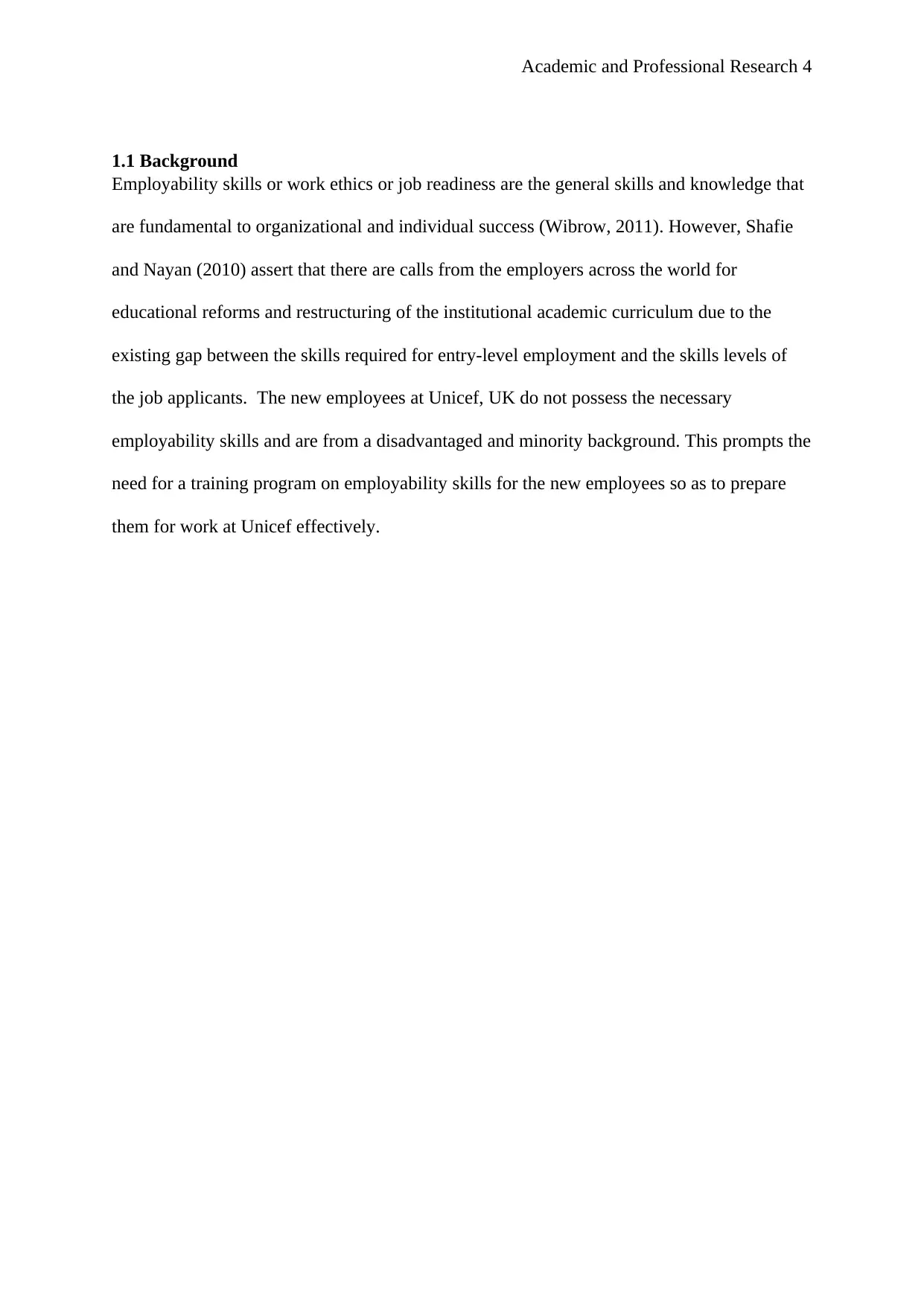
Academic and Professional Research 4
1.1 Background
Employability skills or work ethics or job readiness are the general skills and knowledge that
are fundamental to organizational and individual success (Wibrow, 2011). However, Shafie
and Nayan (2010) assert that there are calls from the employers across the world for
educational reforms and restructuring of the institutional academic curriculum due to the
existing gap between the skills required for entry-level employment and the skills levels of
the job applicants. The new employees at Unicef, UK do not possess the necessary
employability skills and are from a disadvantaged and minority background. This prompts the
need for a training program on employability skills for the new employees so as to prepare
them for work at Unicef effectively.
1.1 Background
Employability skills or work ethics or job readiness are the general skills and knowledge that
are fundamental to organizational and individual success (Wibrow, 2011). However, Shafie
and Nayan (2010) assert that there are calls from the employers across the world for
educational reforms and restructuring of the institutional academic curriculum due to the
existing gap between the skills required for entry-level employment and the skills levels of
the job applicants. The new employees at Unicef, UK do not possess the necessary
employability skills and are from a disadvantaged and minority background. This prompts the
need for a training program on employability skills for the new employees so as to prepare
them for work at Unicef effectively.
Paraphrase This Document
Need a fresh take? Get an instant paraphrase of this document with our AI Paraphraser
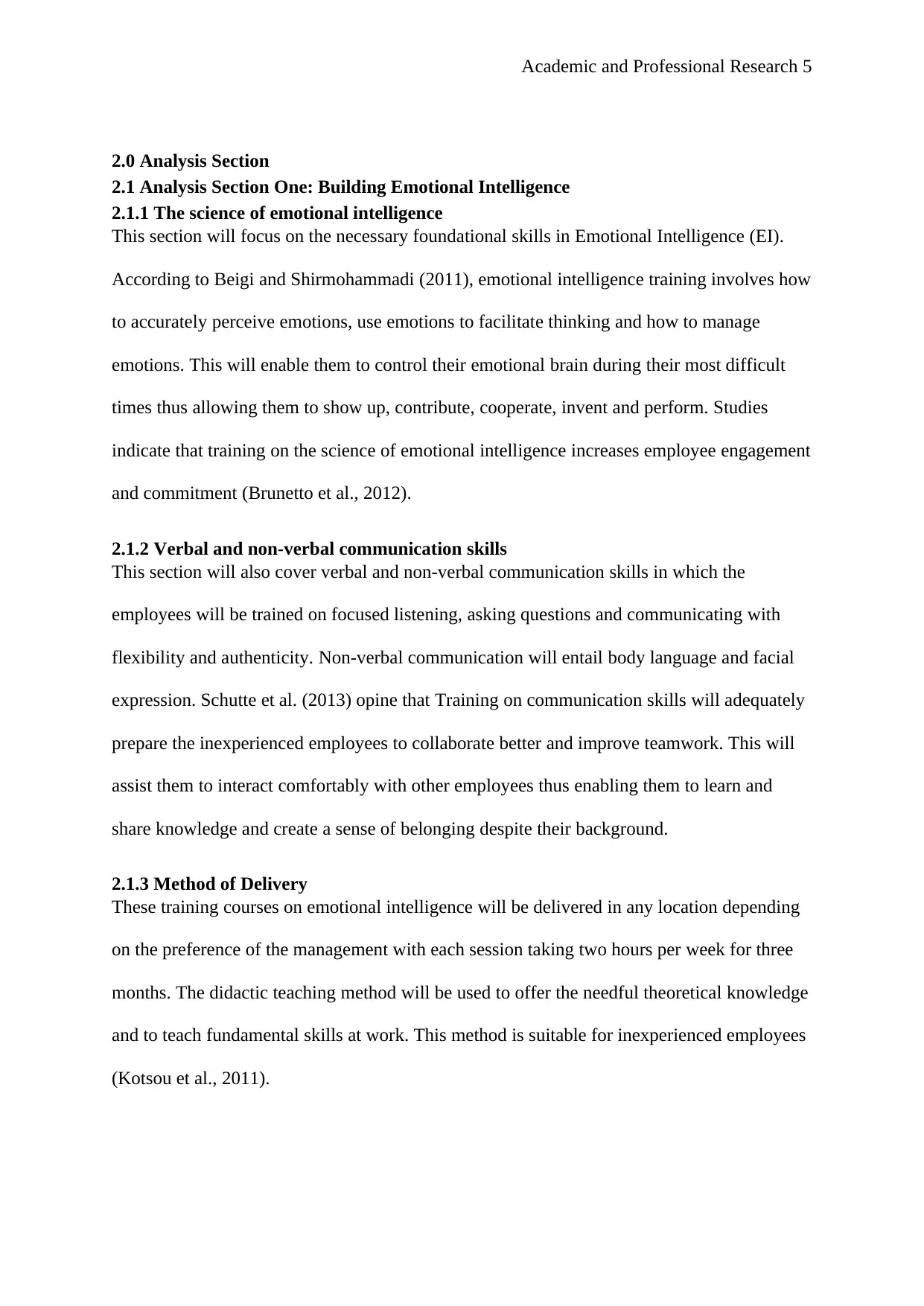
Academic and Professional Research 5
2.0 Analysis Section
2.1 Analysis Section One: Building Emotional Intelligence
2.1.1 The science of emotional intelligence
This section will focus on the necessary foundational skills in Emotional Intelligence (EI).
According to Beigi and Shirmohammadi (2011), emotional intelligence training involves how
to accurately perceive emotions, use emotions to facilitate thinking and how to manage
emotions. This will enable them to control their emotional brain during their most difficult
times thus allowing them to show up, contribute, cooperate, invent and perform. Studies
indicate that training on the science of emotional intelligence increases employee engagement
and commitment (Brunetto et al., 2012).
2.1.2 Verbal and non-verbal communication skills
This section will also cover verbal and non-verbal communication skills in which the
employees will be trained on focused listening, asking questions and communicating with
flexibility and authenticity. Non-verbal communication will entail body language and facial
expression. Schutte et al. (2013) opine that Training on communication skills will adequately
prepare the inexperienced employees to collaborate better and improve teamwork. This will
assist them to interact comfortably with other employees thus enabling them to learn and
share knowledge and create a sense of belonging despite their background.
2.1.3 Method of Delivery
These training courses on emotional intelligence will be delivered in any location depending
on the preference of the management with each session taking two hours per week for three
months. The didactic teaching method will be used to offer the needful theoretical knowledge
and to teach fundamental skills at work. This method is suitable for inexperienced employees
(Kotsou et al., 2011).
2.0 Analysis Section
2.1 Analysis Section One: Building Emotional Intelligence
2.1.1 The science of emotional intelligence
This section will focus on the necessary foundational skills in Emotional Intelligence (EI).
According to Beigi and Shirmohammadi (2011), emotional intelligence training involves how
to accurately perceive emotions, use emotions to facilitate thinking and how to manage
emotions. This will enable them to control their emotional brain during their most difficult
times thus allowing them to show up, contribute, cooperate, invent and perform. Studies
indicate that training on the science of emotional intelligence increases employee engagement
and commitment (Brunetto et al., 2012).
2.1.2 Verbal and non-verbal communication skills
This section will also cover verbal and non-verbal communication skills in which the
employees will be trained on focused listening, asking questions and communicating with
flexibility and authenticity. Non-verbal communication will entail body language and facial
expression. Schutte et al. (2013) opine that Training on communication skills will adequately
prepare the inexperienced employees to collaborate better and improve teamwork. This will
assist them to interact comfortably with other employees thus enabling them to learn and
share knowledge and create a sense of belonging despite their background.
2.1.3 Method of Delivery
These training courses on emotional intelligence will be delivered in any location depending
on the preference of the management with each session taking two hours per week for three
months. The didactic teaching method will be used to offer the needful theoretical knowledge
and to teach fundamental skills at work. This method is suitable for inexperienced employees
(Kotsou et al., 2011).
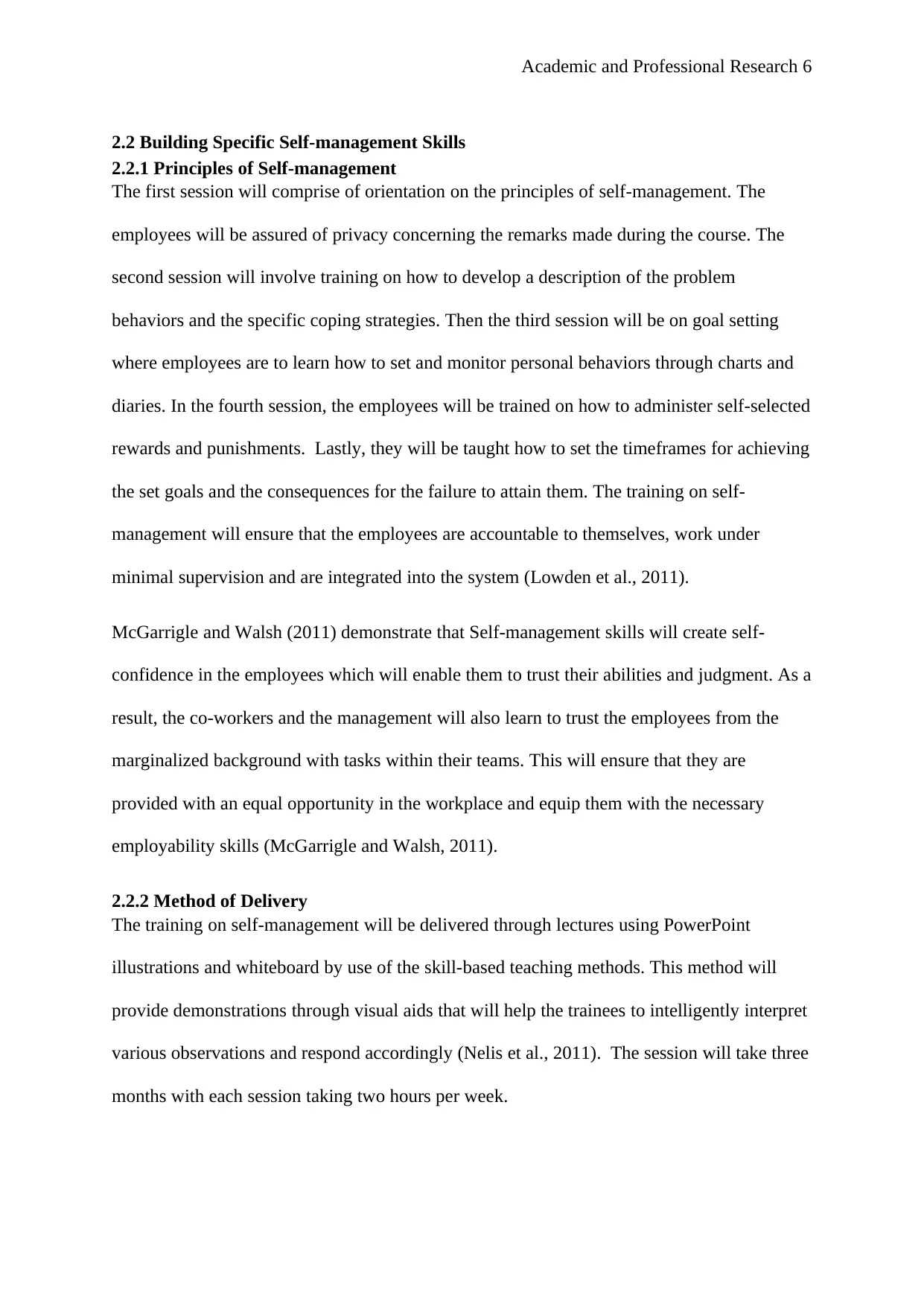
Academic and Professional Research 6
2.2 Building Specific Self-management Skills
2.2.1 Principles of Self-management
The first session will comprise of orientation on the principles of self-management. The
employees will be assured of privacy concerning the remarks made during the course. The
second session will involve training on how to develop a description of the problem
behaviors and the specific coping strategies. Then the third session will be on goal setting
where employees are to learn how to set and monitor personal behaviors through charts and
diaries. In the fourth session, the employees will be trained on how to administer self-selected
rewards and punishments. Lastly, they will be taught how to set the timeframes for achieving
the set goals and the consequences for the failure to attain them. The training on self-
management will ensure that the employees are accountable to themselves, work under
minimal supervision and are integrated into the system (Lowden et al., 2011).
McGarrigle and Walsh (2011) demonstrate that Self-management skills will create self-
confidence in the employees which will enable them to trust their abilities and judgment. As a
result, the co-workers and the management will also learn to trust the employees from the
marginalized background with tasks within their teams. This will ensure that they are
provided with an equal opportunity in the workplace and equip them with the necessary
employability skills (McGarrigle and Walsh, 2011).
2.2.2 Method of Delivery
The training on self-management will be delivered through lectures using PowerPoint
illustrations and whiteboard by use of the skill-based teaching methods. This method will
provide demonstrations through visual aids that will help the trainees to intelligently interpret
various observations and respond accordingly (Nelis et al., 2011). The session will take three
months with each session taking two hours per week.
2.2 Building Specific Self-management Skills
2.2.1 Principles of Self-management
The first session will comprise of orientation on the principles of self-management. The
employees will be assured of privacy concerning the remarks made during the course. The
second session will involve training on how to develop a description of the problem
behaviors and the specific coping strategies. Then the third session will be on goal setting
where employees are to learn how to set and monitor personal behaviors through charts and
diaries. In the fourth session, the employees will be trained on how to administer self-selected
rewards and punishments. Lastly, they will be taught how to set the timeframes for achieving
the set goals and the consequences for the failure to attain them. The training on self-
management will ensure that the employees are accountable to themselves, work under
minimal supervision and are integrated into the system (Lowden et al., 2011).
McGarrigle and Walsh (2011) demonstrate that Self-management skills will create self-
confidence in the employees which will enable them to trust their abilities and judgment. As a
result, the co-workers and the management will also learn to trust the employees from the
marginalized background with tasks within their teams. This will ensure that they are
provided with an equal opportunity in the workplace and equip them with the necessary
employability skills (McGarrigle and Walsh, 2011).
2.2.2 Method of Delivery
The training on self-management will be delivered through lectures using PowerPoint
illustrations and whiteboard by use of the skill-based teaching methods. This method will
provide demonstrations through visual aids that will help the trainees to intelligently interpret
various observations and respond accordingly (Nelis et al., 2011). The session will take three
months with each session taking two hours per week.
⊘ This is a preview!⊘
Do you want full access?
Subscribe today to unlock all pages.

Trusted by 1+ million students worldwide
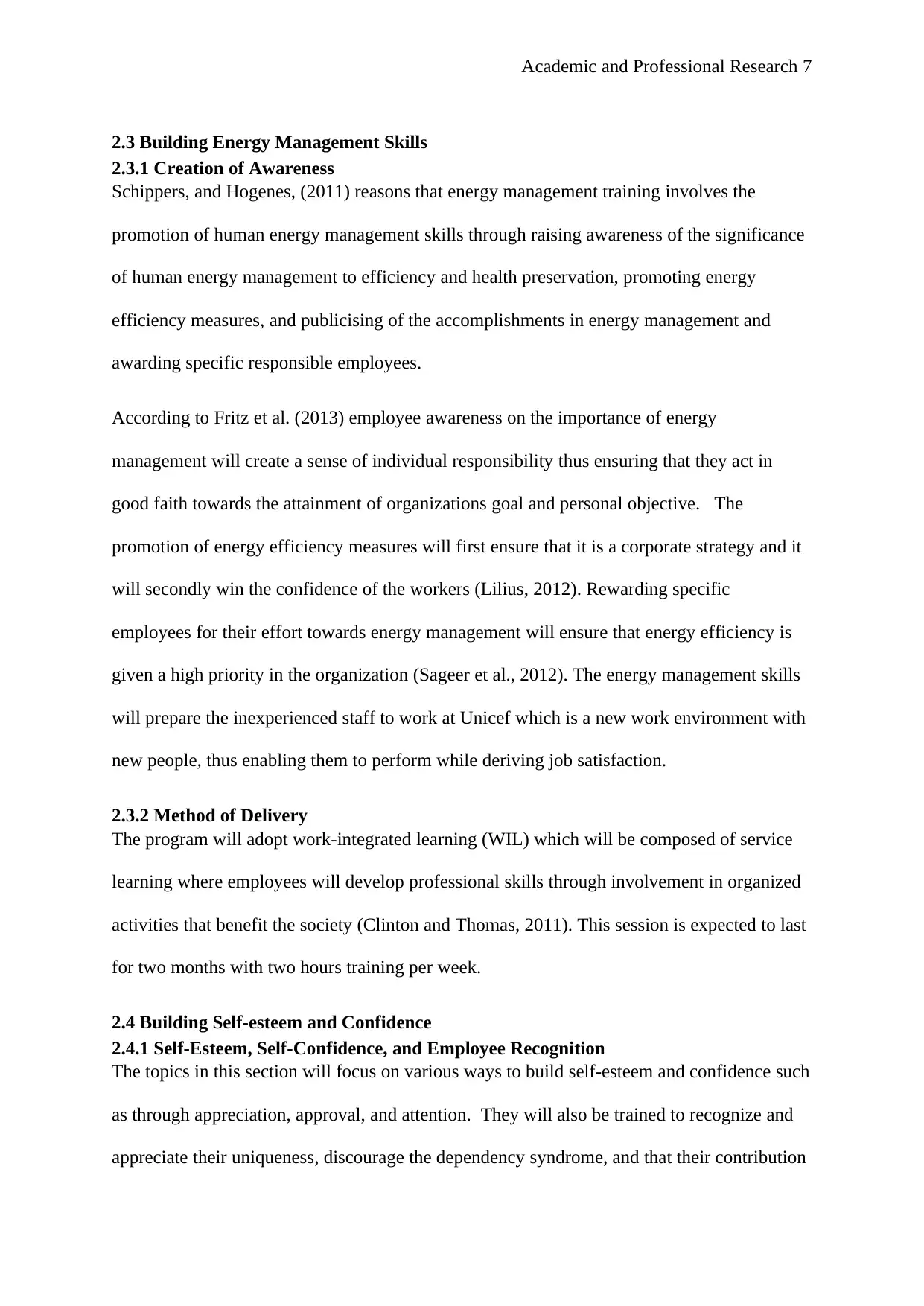
Academic and Professional Research 7
2.3 Building Energy Management Skills
2.3.1 Creation of Awareness
Schippers, and Hogenes, (2011) reasons that energy management training involves the
promotion of human energy management skills through raising awareness of the significance
of human energy management to efficiency and health preservation, promoting energy
efficiency measures, and publicising of the accomplishments in energy management and
awarding specific responsible employees.
According to Fritz et al. (2013) employee awareness on the importance of energy
management will create a sense of individual responsibility thus ensuring that they act in
good faith towards the attainment of organizations goal and personal objective. The
promotion of energy efficiency measures will first ensure that it is a corporate strategy and it
will secondly win the confidence of the workers (Lilius, 2012). Rewarding specific
employees for their effort towards energy management will ensure that energy efficiency is
given a high priority in the organization (Sageer et al., 2012). The energy management skills
will prepare the inexperienced staff to work at Unicef which is a new work environment with
new people, thus enabling them to perform while deriving job satisfaction.
2.3.2 Method of Delivery
The program will adopt work-integrated learning (WIL) which will be composed of service
learning where employees will develop professional skills through involvement in organized
activities that benefit the society (Clinton and Thomas, 2011). This session is expected to last
for two months with two hours training per week.
2.4 Building Self-esteem and Confidence
2.4.1 Self-Esteem, Self-Confidence, and Employee Recognition
The topics in this section will focus on various ways to build self-esteem and confidence such
as through appreciation, approval, and attention. They will also be trained to recognize and
appreciate their uniqueness, discourage the dependency syndrome, and that their contribution
2.3 Building Energy Management Skills
2.3.1 Creation of Awareness
Schippers, and Hogenes, (2011) reasons that energy management training involves the
promotion of human energy management skills through raising awareness of the significance
of human energy management to efficiency and health preservation, promoting energy
efficiency measures, and publicising of the accomplishments in energy management and
awarding specific responsible employees.
According to Fritz et al. (2013) employee awareness on the importance of energy
management will create a sense of individual responsibility thus ensuring that they act in
good faith towards the attainment of organizations goal and personal objective. The
promotion of energy efficiency measures will first ensure that it is a corporate strategy and it
will secondly win the confidence of the workers (Lilius, 2012). Rewarding specific
employees for their effort towards energy management will ensure that energy efficiency is
given a high priority in the organization (Sageer et al., 2012). The energy management skills
will prepare the inexperienced staff to work at Unicef which is a new work environment with
new people, thus enabling them to perform while deriving job satisfaction.
2.3.2 Method of Delivery
The program will adopt work-integrated learning (WIL) which will be composed of service
learning where employees will develop professional skills through involvement in organized
activities that benefit the society (Clinton and Thomas, 2011). This session is expected to last
for two months with two hours training per week.
2.4 Building Self-esteem and Confidence
2.4.1 Self-Esteem, Self-Confidence, and Employee Recognition
The topics in this section will focus on various ways to build self-esteem and confidence such
as through appreciation, approval, and attention. They will also be trained to recognize and
appreciate their uniqueness, discourage the dependency syndrome, and that their contribution
Paraphrase This Document
Need a fresh take? Get an instant paraphrase of this document with our AI Paraphraser
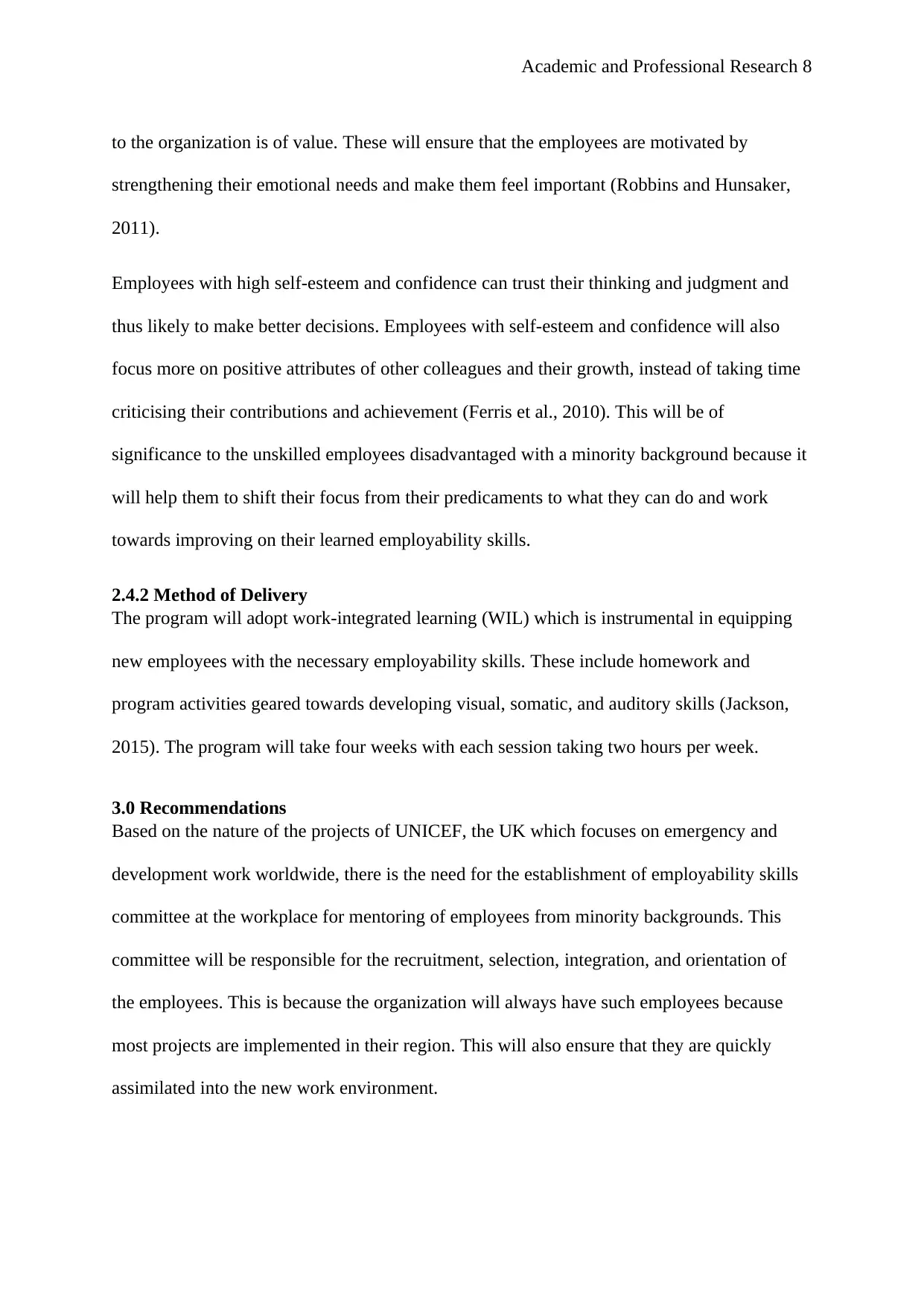
Academic and Professional Research 8
to the organization is of value. These will ensure that the employees are motivated by
strengthening their emotional needs and make them feel important (Robbins and Hunsaker,
2011).
Employees with high self-esteem and confidence can trust their thinking and judgment and
thus likely to make better decisions. Employees with self-esteem and confidence will also
focus more on positive attributes of other colleagues and their growth, instead of taking time
criticising their contributions and achievement (Ferris et al., 2010). This will be of
significance to the unskilled employees disadvantaged with a minority background because it
will help them to shift their focus from their predicaments to what they can do and work
towards improving on their learned employability skills.
2.4.2 Method of Delivery
The program will adopt work-integrated learning (WIL) which is instrumental in equipping
new employees with the necessary employability skills. These include homework and
program activities geared towards developing visual, somatic, and auditory skills (Jackson,
2015). The program will take four weeks with each session taking two hours per week.
3.0 Recommendations
Based on the nature of the projects of UNICEF, the UK which focuses on emergency and
development work worldwide, there is the need for the establishment of employability skills
committee at the workplace for mentoring of employees from minority backgrounds. This
committee will be responsible for the recruitment, selection, integration, and orientation of
the employees. This is because the organization will always have such employees because
most projects are implemented in their region. This will also ensure that they are quickly
assimilated into the new work environment.
to the organization is of value. These will ensure that the employees are motivated by
strengthening their emotional needs and make them feel important (Robbins and Hunsaker,
2011).
Employees with high self-esteem and confidence can trust their thinking and judgment and
thus likely to make better decisions. Employees with self-esteem and confidence will also
focus more on positive attributes of other colleagues and their growth, instead of taking time
criticising their contributions and achievement (Ferris et al., 2010). This will be of
significance to the unskilled employees disadvantaged with a minority background because it
will help them to shift their focus from their predicaments to what they can do and work
towards improving on their learned employability skills.
2.4.2 Method of Delivery
The program will adopt work-integrated learning (WIL) which is instrumental in equipping
new employees with the necessary employability skills. These include homework and
program activities geared towards developing visual, somatic, and auditory skills (Jackson,
2015). The program will take four weeks with each session taking two hours per week.
3.0 Recommendations
Based on the nature of the projects of UNICEF, the UK which focuses on emergency and
development work worldwide, there is the need for the establishment of employability skills
committee at the workplace for mentoring of employees from minority backgrounds. This
committee will be responsible for the recruitment, selection, integration, and orientation of
the employees. This is because the organization will always have such employees because
most projects are implemented in their region. This will also ensure that they are quickly
assimilated into the new work environment.
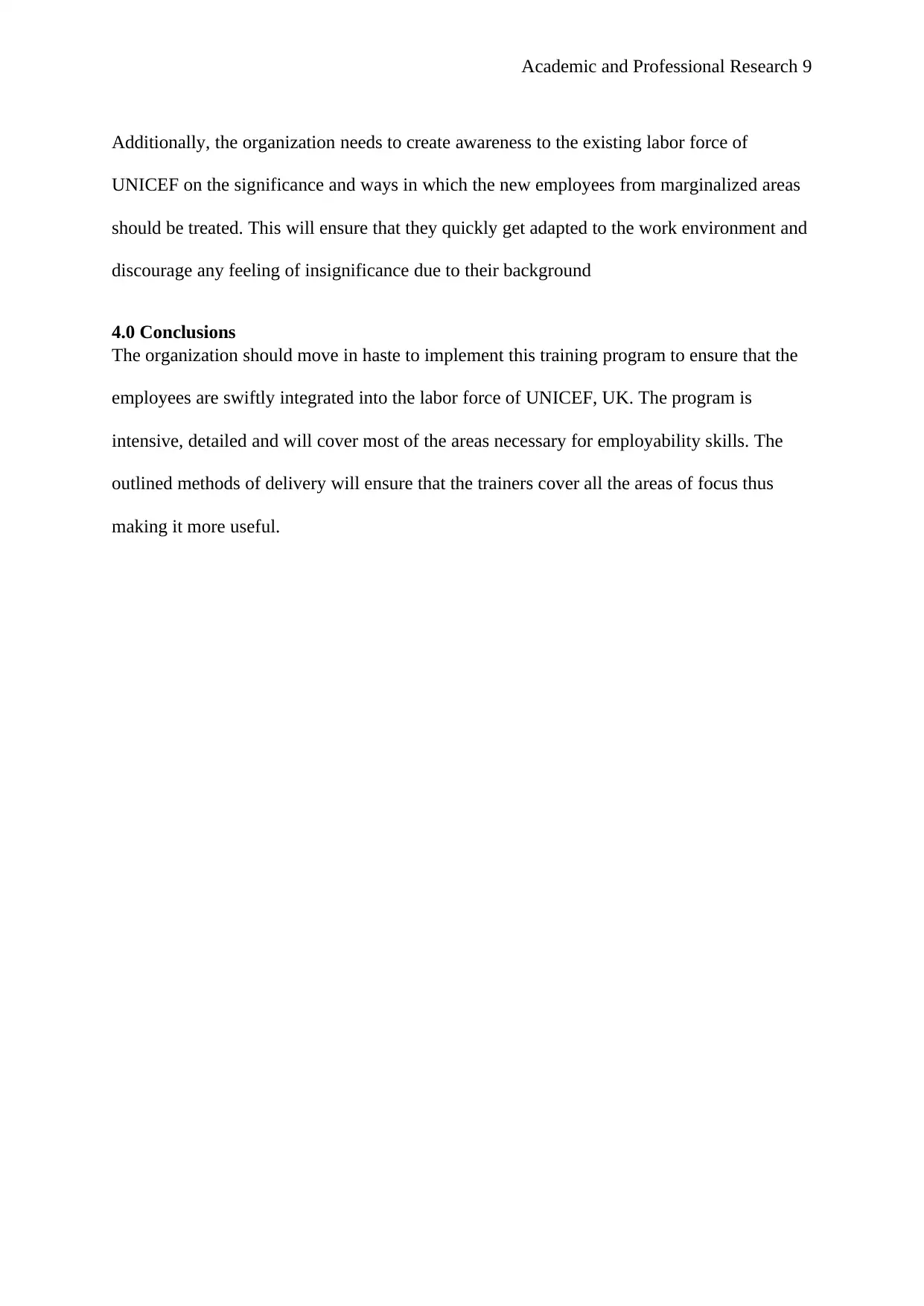
Academic and Professional Research 9
Additionally, the organization needs to create awareness to the existing labor force of
UNICEF on the significance and ways in which the new employees from marginalized areas
should be treated. This will ensure that they quickly get adapted to the work environment and
discourage any feeling of insignificance due to their background
4.0 Conclusions
The organization should move in haste to implement this training program to ensure that the
employees are swiftly integrated into the labor force of UNICEF, UK. The program is
intensive, detailed and will cover most of the areas necessary for employability skills. The
outlined methods of delivery will ensure that the trainers cover all the areas of focus thus
making it more useful.
Additionally, the organization needs to create awareness to the existing labor force of
UNICEF on the significance and ways in which the new employees from marginalized areas
should be treated. This will ensure that they quickly get adapted to the work environment and
discourage any feeling of insignificance due to their background
4.0 Conclusions
The organization should move in haste to implement this training program to ensure that the
employees are swiftly integrated into the labor force of UNICEF, UK. The program is
intensive, detailed and will cover most of the areas necessary for employability skills. The
outlined methods of delivery will ensure that the trainers cover all the areas of focus thus
making it more useful.
⊘ This is a preview!⊘
Do you want full access?
Subscribe today to unlock all pages.

Trusted by 1+ million students worldwide
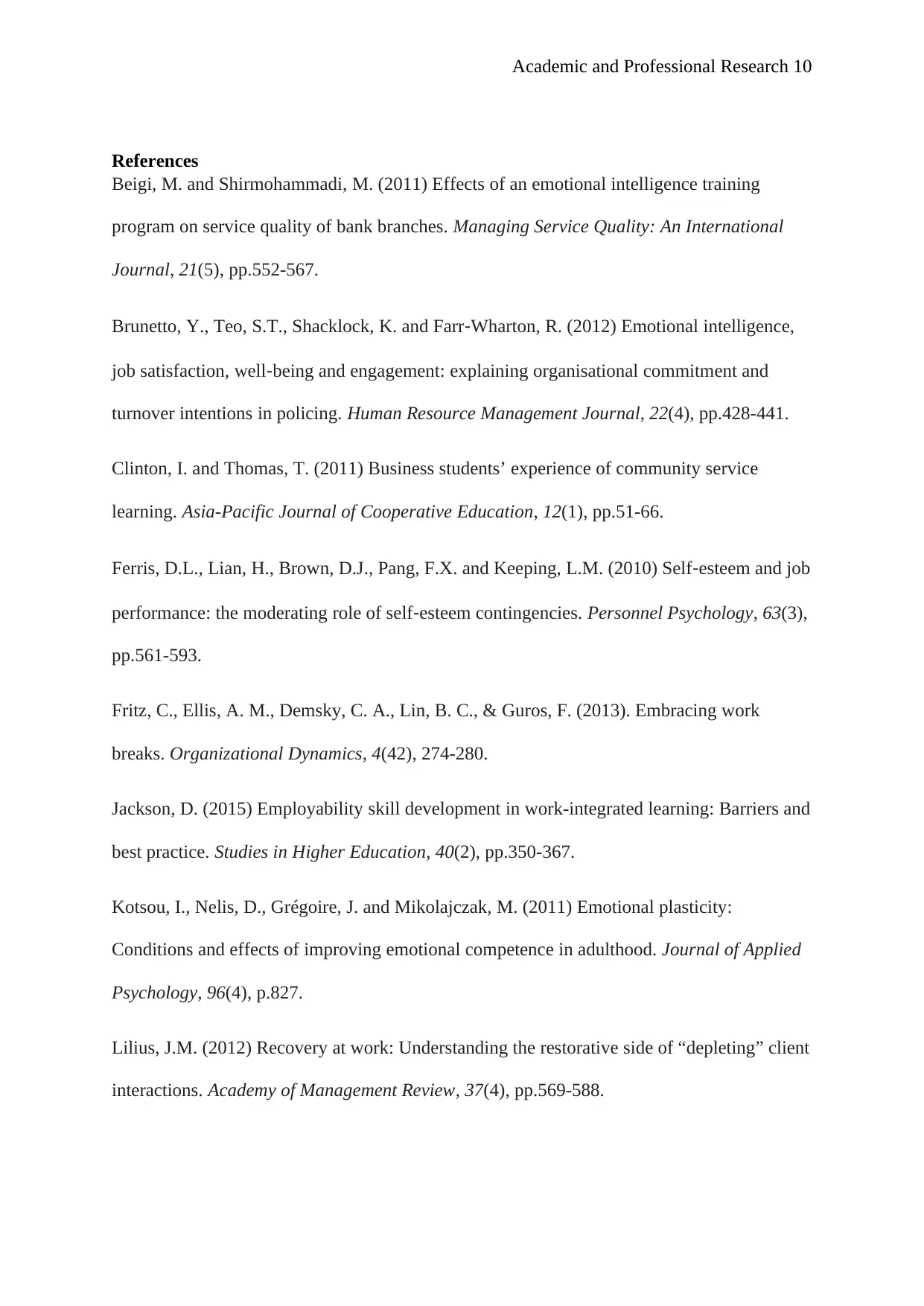
Academic and Professional Research 10
References
Beigi, M. and Shirmohammadi, M. (2011) Effects of an emotional intelligence training
program on service quality of bank branches. Managing Service Quality: An International
Journal, 21(5), pp.552-567.
Brunetto, Y., Teo, S.T., Shacklock, K. and Farr‐Wharton, R. (2012) Emotional intelligence,
job satisfaction, well‐being and engagement: explaining organisational commitment and
turnover intentions in policing. Human Resource Management Journal, 22(4), pp.428-441.
Clinton, I. and Thomas, T. (2011) Business students’ experience of community service
learning. Asia-Pacific Journal of Cooperative Education, 12(1), pp.51-66.
Ferris, D.L., Lian, H., Brown, D.J., Pang, F.X. and Keeping, L.M. (2010) Self‐esteem and job
performance: the moderating role of self‐esteem contingencies. Personnel Psychology, 63(3),
pp.561-593.
Fritz, C., Ellis, A. M., Demsky, C. A., Lin, B. C., & Guros, F. (2013). Embracing work
breaks. Organizational Dynamics, 4(42), 274-280.
Jackson, D. (2015) Employability skill development in work-integrated learning: Barriers and
best practice. Studies in Higher Education, 40(2), pp.350-367.
Kotsou, I., Nelis, D., Grégoire, J. and Mikolajczak, M. (2011) Emotional plasticity:
Conditions and effects of improving emotional competence in adulthood. Journal of Applied
Psychology, 96(4), p.827.
Lilius, J.M. (2012) Recovery at work: Understanding the restorative side of “depleting” client
interactions. Academy of Management Review, 37(4), pp.569-588.
References
Beigi, M. and Shirmohammadi, M. (2011) Effects of an emotional intelligence training
program on service quality of bank branches. Managing Service Quality: An International
Journal, 21(5), pp.552-567.
Brunetto, Y., Teo, S.T., Shacklock, K. and Farr‐Wharton, R. (2012) Emotional intelligence,
job satisfaction, well‐being and engagement: explaining organisational commitment and
turnover intentions in policing. Human Resource Management Journal, 22(4), pp.428-441.
Clinton, I. and Thomas, T. (2011) Business students’ experience of community service
learning. Asia-Pacific Journal of Cooperative Education, 12(1), pp.51-66.
Ferris, D.L., Lian, H., Brown, D.J., Pang, F.X. and Keeping, L.M. (2010) Self‐esteem and job
performance: the moderating role of self‐esteem contingencies. Personnel Psychology, 63(3),
pp.561-593.
Fritz, C., Ellis, A. M., Demsky, C. A., Lin, B. C., & Guros, F. (2013). Embracing work
breaks. Organizational Dynamics, 4(42), 274-280.
Jackson, D. (2015) Employability skill development in work-integrated learning: Barriers and
best practice. Studies in Higher Education, 40(2), pp.350-367.
Kotsou, I., Nelis, D., Grégoire, J. and Mikolajczak, M. (2011) Emotional plasticity:
Conditions and effects of improving emotional competence in adulthood. Journal of Applied
Psychology, 96(4), p.827.
Lilius, J.M. (2012) Recovery at work: Understanding the restorative side of “depleting” client
interactions. Academy of Management Review, 37(4), pp.569-588.
Paraphrase This Document
Need a fresh take? Get an instant paraphrase of this document with our AI Paraphraser
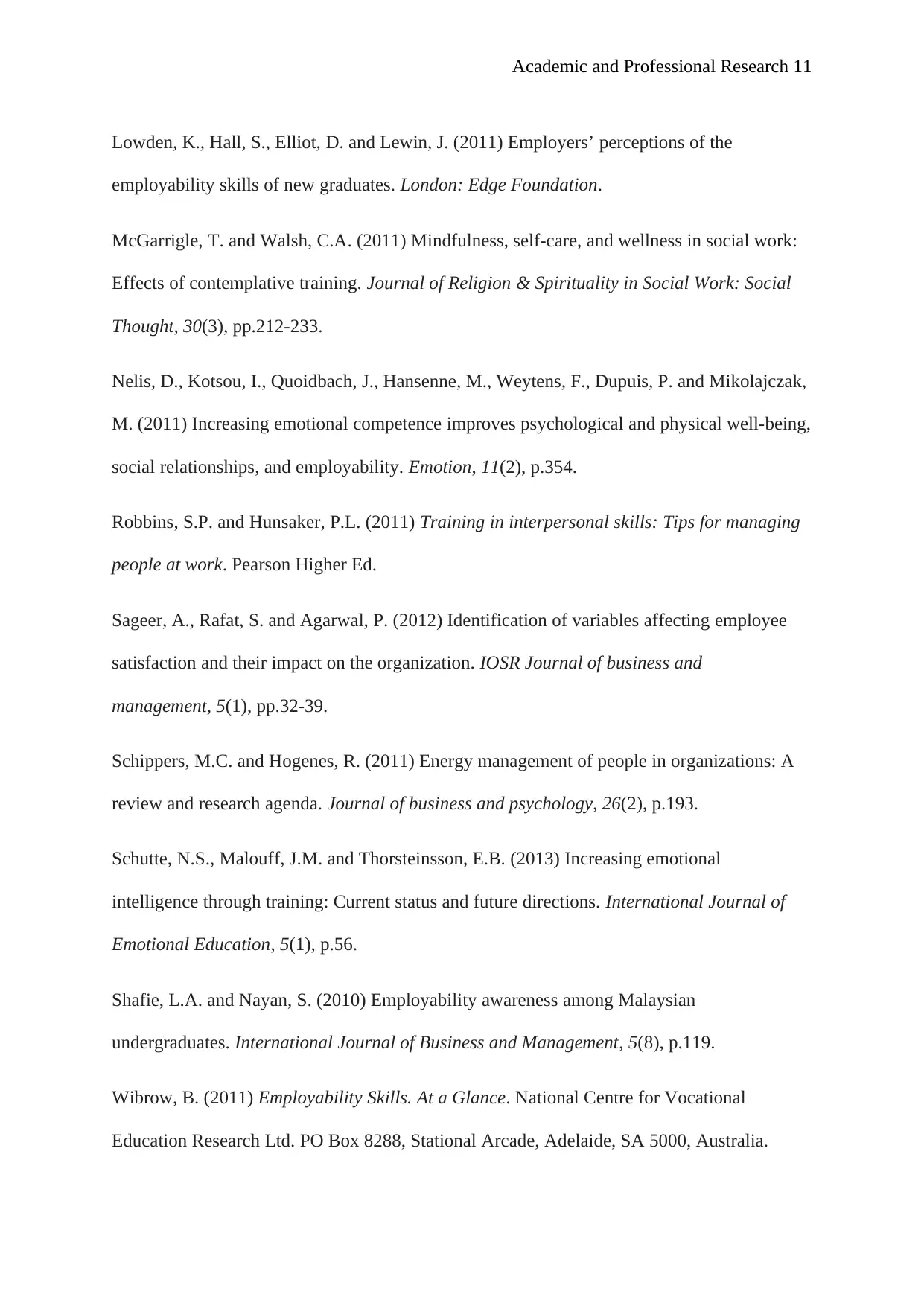
Academic and Professional Research 11
Lowden, K., Hall, S., Elliot, D. and Lewin, J. (2011) Employers’ perceptions of the
employability skills of new graduates. London: Edge Foundation.
McGarrigle, T. and Walsh, C.A. (2011) Mindfulness, self-care, and wellness in social work:
Effects of contemplative training. Journal of Religion & Spirituality in Social Work: Social
Thought, 30(3), pp.212-233.
Nelis, D., Kotsou, I., Quoidbach, J., Hansenne, M., Weytens, F., Dupuis, P. and Mikolajczak,
M. (2011) Increasing emotional competence improves psychological and physical well-being,
social relationships, and employability. Emotion, 11(2), p.354.
Robbins, S.P. and Hunsaker, P.L. (2011) Training in interpersonal skills: Tips for managing
people at work. Pearson Higher Ed.
Sageer, A., Rafat, S. and Agarwal, P. (2012) Identification of variables affecting employee
satisfaction and their impact on the organization. IOSR Journal of business and
management, 5(1), pp.32-39.
Schippers, M.C. and Hogenes, R. (2011) Energy management of people in organizations: A
review and research agenda. Journal of business and psychology, 26(2), p.193.
Schutte, N.S., Malouff, J.M. and Thorsteinsson, E.B. (2013) Increasing emotional
intelligence through training: Current status and future directions. International Journal of
Emotional Education, 5(1), p.56.
Shafie, L.A. and Nayan, S. (2010) Employability awareness among Malaysian
undergraduates. International Journal of Business and Management, 5(8), p.119.
Wibrow, B. (2011) Employability Skills. At a Glance. National Centre for Vocational
Education Research Ltd. PO Box 8288, Stational Arcade, Adelaide, SA 5000, Australia.
Lowden, K., Hall, S., Elliot, D. and Lewin, J. (2011) Employers’ perceptions of the
employability skills of new graduates. London: Edge Foundation.
McGarrigle, T. and Walsh, C.A. (2011) Mindfulness, self-care, and wellness in social work:
Effects of contemplative training. Journal of Religion & Spirituality in Social Work: Social
Thought, 30(3), pp.212-233.
Nelis, D., Kotsou, I., Quoidbach, J., Hansenne, M., Weytens, F., Dupuis, P. and Mikolajczak,
M. (2011) Increasing emotional competence improves psychological and physical well-being,
social relationships, and employability. Emotion, 11(2), p.354.
Robbins, S.P. and Hunsaker, P.L. (2011) Training in interpersonal skills: Tips for managing
people at work. Pearson Higher Ed.
Sageer, A., Rafat, S. and Agarwal, P. (2012) Identification of variables affecting employee
satisfaction and their impact on the organization. IOSR Journal of business and
management, 5(1), pp.32-39.
Schippers, M.C. and Hogenes, R. (2011) Energy management of people in organizations: A
review and research agenda. Journal of business and psychology, 26(2), p.193.
Schutte, N.S., Malouff, J.M. and Thorsteinsson, E.B. (2013) Increasing emotional
intelligence through training: Current status and future directions. International Journal of
Emotional Education, 5(1), p.56.
Shafie, L.A. and Nayan, S. (2010) Employability awareness among Malaysian
undergraduates. International Journal of Business and Management, 5(8), p.119.
Wibrow, B. (2011) Employability Skills. At a Glance. National Centre for Vocational
Education Research Ltd. PO Box 8288, Stational Arcade, Adelaide, SA 5000, Australia.

Academic and Professional Research 12
⊘ This is a preview!⊘
Do you want full access?
Subscribe today to unlock all pages.

Trusted by 1+ million students worldwide
1 out of 12
Related Documents
Your All-in-One AI-Powered Toolkit for Academic Success.
+13062052269
info@desklib.com
Available 24*7 on WhatsApp / Email
![[object Object]](/_next/static/media/star-bottom.7253800d.svg)
Unlock your academic potential
Copyright © 2020–2026 A2Z Services. All Rights Reserved. Developed and managed by ZUCOL.





